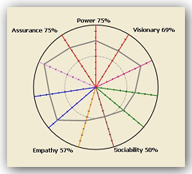 In the workplace, it is common to encounter a mix of different personalities, viewpoints, past experiences, expectations, communication issues and conflicts. How can you get such different people to work as an effective team? How do you improve communication? How can you resolve and prevent conflicts? How can you help employees succeed in today’s fast-paced environment? How do you establish an effective work environment? How do you increase workplace productivity and job satisfaction? How do you motivate employees and become a better leader? These are just some examples of the workplace issues that can be effectively addressed once you are equipped with the results of the personality assessment of your employees that is specifically designed for the workplace – the Jung Typology Profiler for Workplace™ (JTPW™) - and the base of it is understanding your employees’ personality types and their natural behavioural preferences and gifts.
In the workplace, it is common to encounter a mix of different personalities, viewpoints, past experiences, expectations, communication issues and conflicts. How can you get such different people to work as an effective team? How do you improve communication? How can you resolve and prevent conflicts? How can you help employees succeed in today’s fast-paced environment? How do you establish an effective work environment? How do you increase workplace productivity and job satisfaction? How do you motivate employees and become a better leader? These are just some examples of the workplace issues that can be effectively addressed once you are equipped with the results of the personality assessment of your employees that is specifically designed for the workplace – the Jung Typology Profiler for Workplace™ (JTPW™) - and the base of it is understanding your employees’ personality types and their natural behavioural preferences and gifts.
Jung Typology Profiler for Workplace™ is the professional version of the Jung Typology Test™. JTPW™ is designed for application in the workplace, and is aimed at organizations and business users. More info about JTPW™
You and your company can use JTPW™ for:
- Assessing employee potential and optimizing their job responsibilities accordingly
- Assessing the propensity for, and developing and optimizing the use of, leadership skills of your staff
- Conflict Management
- Improving supervisor-subordinate and peer-to-peer work relationship
- Improving teamwork
- Evaluating candidates for promotion
JTPW™ personality assessments and tools for staff development and team building are offered from our HRPersonality.com website.
Assessing Employee’s Potentials and Optimizing Job Responsibilities
One of the applications of the JTPW™ is the assessment of an employee in order to determine areas and responsibilities where an employee can contribute to their fullest potential and most productively. The JTPW™ also determines an employee’s motivating factors, as well as his or her potential strengths and limitations, in terms of soft skills. An understanding of these aspects of employees’ personalities allows managers to maximize the effectiveness of each individual employee, and the effectiveness of a team as a whole, increase job satisfaction and reduce work-related stress. The ultimate outcome is a greater overall productivity and a decrease in turnover.
Assessing and Developing Leadership Skills
This is another important use of the JTPW™ in the workplace. With JTPW™ you can obtain evaluation of an individual’s propensity for natural leadership talents. The assessment pinpoints an individual’s leadership style and the extent to which he or she is likely to display leadership qualities. Understanding one’s own leadership style allows an employee to make use of his or her natural strengths and recognize potential limitations. The awareness of these strengths and limitations gives a leader the ability to see if any changes might be necessary and take proper steps in that direction.
Effective Working Relationship between Two Employees
The third important application of the JTPW™ is improvement of work relationship involving two employees, such as a manager and his or her subordinate, or two peers working together. With JTPW™ you can assess the propensity for effective collaboration and reveal potential sources of “friction”. The assessment includes analyzing the combination of personality types and several behavioral indices of the individuals involved, and identifying areas of likely concurrence or dissonance. The behavioral indices that scored close in both individuals determine the areas of likely concurrence. The behavioral indices that scored significantly different in both individuals determine the areas of divergence. Depending on a situation areas of divergence may or may not become a source of a conflict. The report produced by JTPW™ includes tips on leveraging areas of concurrence and mitigate potential issues sourcing from areas of divergence, in order to establish the most effective and mutually acceptable working relationship.
New! The unique 1:1 Personality Compatibility Report is offered is now offered to organizations from our HRPersonality.com assessment portal. It provides personality compatibility analysis of a pair of respondents and features the personality compatibility potential indicator. The indicator factors in the differences in behavioral traits, their expressiveness, and the differences in personality types of the respondents. The report includes:
- personality compatibility potential indicator




- side-by-side comparison of behavioral scores and personality radars of respondents
- analysis, interpretation and tips on how to prevent potential (or manage the existing) tension and conflict between individuals
Use this report to explore personality compatibility between the prospective and the existing team members or the leader, between the existing team members, or between the team members and the leader.
Improving Teamwork
Personality assessment with JTPW™ can be effectively used to improve teamwork and team productivity when we are talking about teams of two and more employees. An assessment for the purposes of effective teaming includes:
- Identifying the points of concurrence and points of friction between team members as explained in the previous paragraph
 Reviewing Group Personality Radar™ graph that visually represents the strengths of the key workplace-related behavioral qualities of a team, in such categories as leadership, communication, diligence, empathy, rationality and analyticity. Group Personality Radar™ is a useful tool for determining group's likely strengths and potential deficiencies as a whole. Comparing team members’ Personality Radars with a team’s Group Personality Radar™ reveals propensity for compatibility of an individual team member with the behavioral patterns that are dominant within the group. Likewise it may also reveal potential friction between the individual and the group.
Reviewing Group Personality Radar™ graph that visually represents the strengths of the key workplace-related behavioral qualities of a team, in such categories as leadership, communication, diligence, empathy, rationality and analyticity. Group Personality Radar™ is a useful tool for determining group's likely strengths and potential deficiencies as a whole. Comparing team members’ Personality Radars with a team’s Group Personality Radar™ reveals propensity for compatibility of an individual team member with the behavioral patterns that are dominant within the group. Likewise it may also reveal potential friction between the individual and the group.- Comparing Personality Radars of the team members with the Personality Radar™ of the team leader, in order to evaluate the degree of cooperation that is likely to occur between the team member and the team leader, and also the degree of tension that may potentially arise in situations of conflict.
- The Group Personality Radar™ also allows for quantitative evaluation of the degree of change in the personality traits within a group in response to changes in the structure of the group – for example, possible effects of adding or removing an individual from the team. You might want to introduce a new member to the team in order to enhance certain behavioral traits of the team as a whole. For example, adding a new team member who scores high on rationality index will increase the rationality of the team as a whole.
- You can also track the changes within the group as the group is put through specific targeted training programs.
Evaluating Candidates for Promotion
Assessment with JTPW™ can be incorporated into your organization’s process of internal promotion and succession planning, and can be used for candidate’s evaluation, including the assessment of their likely effectiveness within a new team, from the soft skills/leadership skills perspective.
For the purposes of such evaluation, the candidate will complete JTPW™ questionnaire and a report called Career Development report will be produced by the system. The Career Development report, among other things, includes several behavioral scores in various areas. The scores are indicative of behavioral preferences and natural gifts the candidate is likely to demonstrate. These scores need then to be analyzed in the context of the requirements of the new job.
In addition, it is recommended to determine and analyze the likely effects of introducing the candidate into an existing team. In order to accomplish this analysis, all individuals that the candidate will actively interact with (or at least the ones with whom it is particularly important to insure smooth interaction), will have to complete personality assessment with JTPW. Using the previously described methodology of assessing work relationship in pairs, you can evaluate how effectively the candidate will likely integrate with specific members of the team or with the team as a whole, and the potential challenges that they may encounter while working together. The results of this analysis can then be used to make specific recommendations to the candidate and the group aimed at effectively integrating the candidate into the team.
HRPersonality.com Personality Assessment Portal
JTPW™ personality assessments and tools for staff development and team building are offered from our HRPersonality.com online assessment centre. Once you open an account with HRPersonality.com, your company be able to access an online assessment portal that you can navigate and manage independently. Through your portal account you will be able to invite your employees and centrally access their results. Results become available online immediately after an employee completes the assessment. Within your assessment portal you will have access to various components of JTPW™ and analyze the results using various methods.
You (or your company’s management or HR department) will obtain JTPW™ reports incorporating analysis and interpretation based on various methods.
One such type of analysis presents an evaluation of the personality traits of the employee in the context of the basic theory of pscychological types of Carl Jung and an additional dimension (judging vs. perceiving) proposed in the theory of Isabel Briggs Myers. Whereas further analysis evaluates the employee in five workplace-focused areas including leadership, communication, diligence, empathy, and rationality/analyticity. The strengths of personality traits are quantified, and the scores are presented in a Personality Radar™ graph. Personality Radar™ allows you to quickly evaluate the unique features of an employee’s personality.
You will also obtain an individualized profile of an employee’s personality, giving you a detailed understanding of his or her traits. This profile includes sections on: the best direction for staff development, decision-making style, conflict resolution style, communication style, potential strengths and weaknesses, and more. Get started now - click here to purchase a trial pack.
Share this article with your company’s management or HR department.
Looking for tips for you on how to succeed in the workplace? Complete our premium career development assessment.
